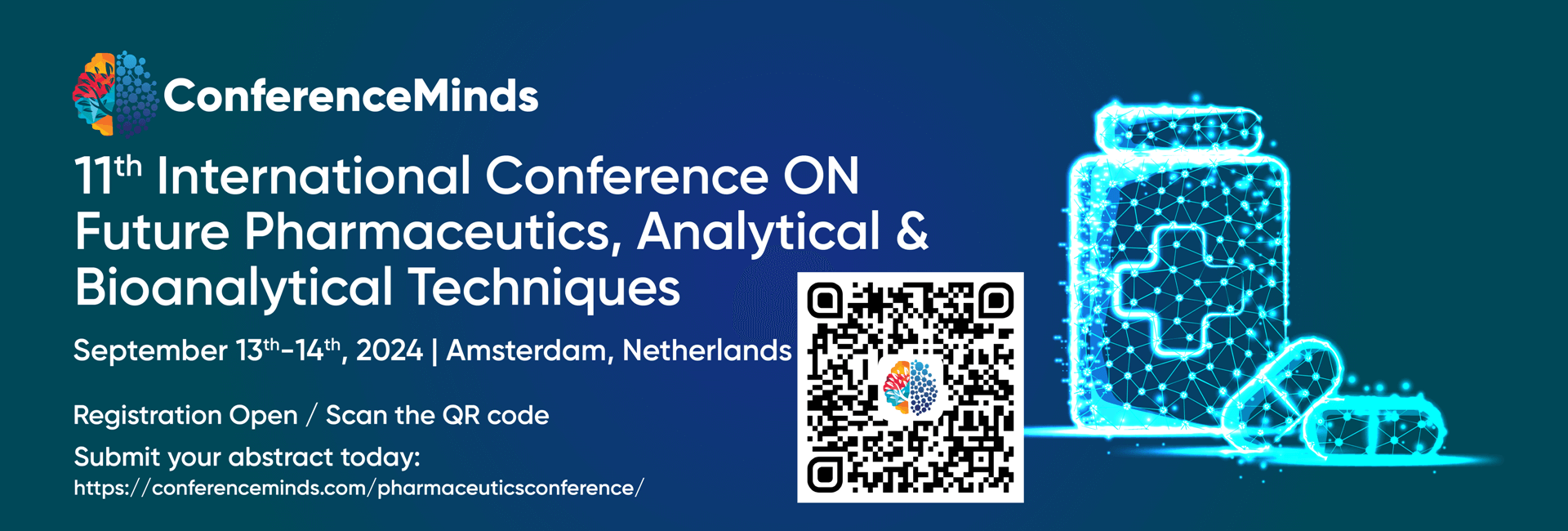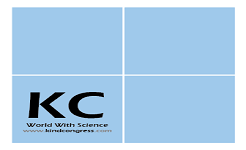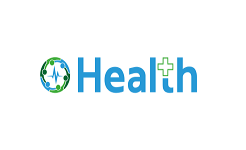
11th International Conference
ON
Future Pharmaceutics, Analytical and Bioanalytical Techniques
Event Date
September 13-14, 2024
Venue
Amsterdam, Netherlands
– Previous Conference Performers / Professionals From Around The Globe –

Aikaterini Ziaka
- Physio4you, Greece

AMR Hawal
- Professor, Prime Healthcare Group UAE

Antonio Steardo
- University of Salerno, Italy

Ashraf Lotfy Fayed
- ENT Military Hospital, Egypt

Aspazija Sofijanova
- Director of Pediatric Clinic, Macedonia

Brandon P. Lucke-Wold
- University of Florida, Florida

Brankica Vasiljevic
- NMC Royal Hospital, UAE

Bruce Ogden
- Director of Operations US Foods USA

Cornelia Beyer
- University of Hull, UK

Grazzia Rey
- University of the Republic, Uruguay

Heather Carmello
- University of Rochester, USA

Howard Weber
- Penn State Hershey Childrens Hospital, USA

Irene Hamrick
- University of Cincinnati, USA

José De Jesús Curiel Valdés
- Clínical Patology, Mexico

Lloyd L. Tran
- Biomed Industries, USA

Luca Roncati
- University Hospital of Modena, Italy

Maria Braoudaki
- University of Hertfordshire , United Kingdom

Marina F Gubkina
- National Research Medical University, Russia

Peter Krcho
- Pavol Jozef safarik University, Slovakia

Pinghong Zhou
- Fudan University, China

Raffaele Pilla
- University of Salerno, Italy

Ruut Veenhoven
- Seres Therapeutics, United States

Said Moustafa M. El-deib
- Yas Clinic Khalifa City UAE

Sajidxa Marino
- Central University of Venezuela, Venezuela

Sajidxa Marino
- Central University of Venezuela, Venezuela

Sam Vaknin
- Southern Federal University, Russia

Sandra Vélez Candelario
- Catholic University of Puerto Rico, USA

Simon Treissman
- Royal Inland Hospital, Canada

Taylor Bean
- Salmon Arm, Canada

Thiago Hoesker
- Neuro surgeon , Brazil

Tracy Roake
- Danat Al Emarat Hospital, UAE

Vladimir Zajac
- Cancer Research Institute, Slovakia

William J Rowe
- Specialist in Medicine, USA

Yacob Mathai
- Marma Health Centre, India

Yu You Liu
- National Chung Hsing University, Taiwan
Media Partners/Collaborator
A huge thanks to all our amazing partners. We couldn’t have a conference without you!










Sponsors/Exhibitors
A huge thanks to all our amazing partners. We couldn’t have a conference without you!


Future Pharma 2024
Welcome to the 11th International conference on Future Pharmaceutics, Analytical and Bioanalytical Techniques scheduled for September 13-14, 2024, in Amsterdam, Netherlands. This premier Pharma event brings together industry leaders, researchers, and professionals to explore the latest advancements, research, and challenges in pharmaceuticalsciences, clinical research, and related areas.
The conference will be organized around the theme “Advancements of Latest Technologies in Analytical and Bioanalytical Techniques”.
Highlights of Future Pharma 2024 Conference:
- 300+ Participants: Including 70 Industry and 30 Academia representatives.
- 10+ Keynote Speakers: Featuring experts from pharmaceutical giants.
- 50+ Plenary Speakers: Sharing insights on the latest trends and challenges.
- 20+ Exhibitors: Showcasing cutting-edge products and services.
- 14 Innovative Educational Sessions: Covering a diverse range of topics.
- 5+ Workshops: Providing hands-on learning experiences.
- B2B Meetings: Facilitating networking opportunities.
- Key Themes:
- New Challenges in Pharma Industries and Growth of Pharmaceutical Research
- Target Audience:
- Directors, CEO’s of Organizations
- Business Development Managers
- Chief Scientific Officers
- R&D Researchers from Pharma Industries
- Professors, Researchers, PhD Scholars
- Patent Attorneys, Investment Analysts
- Bio-instrumentation and Bioinformatics Professionals
- Software Development Companies
- Supply Chain and Manufacturing Companies
- CRO and Data Management Companies
- Young Scientists
Benefits for Young Scientists:
- Platform for research through oral presentations
- Networking opportunities with eminent researchers and mentors
- Young Scientist Award recognition
- Collaboration opportunities for better development
Conference Highlights
- Drug Discovery, Design & Development: Challenges and Approaches
- Pharmaceutical Research & Development
- Pharmaceutical Chemistry
- Pharmacognosy and Photochemistry
- Innovations in Drug Development
- Advanced Drug Delivery Systems
- Drug Safety
- Pharmaceutical Analysis
- Pharmaceuticals Manufacturing
- Industrial & Physical Pharmacy
- Nano-technology In Pharmaceuticals
- Nano medicine & Biomedical Applications
- Pharmaceutical Microbiology
- Pharmacology & Pharmacovigilance
- Radiopharmaceuticals & Biotherapy
- CBD and Cannabinoids
- Formulation Technologies
- Contract Formulation
- Regulatory Affairs
- Performulation Studies
- Clinical Trials
Join us for this exceptional opportunity to explore, learn, and network in the dynamic field of pharmaceuticals. See you in Dubai!
Sessions and Tracks
Track 1. Analytical Chemistry and Methodology
Analytical chemistry encompasses the acquisition, processing, and dissemination of data regarding the composition and arrangement of matter. It employs instruments and techniques to segregate, characterize, and measure substances. Separation techniques isolate analytes. The conventional methods are categorized into qualitative and quantitative approaches. Qualitative analysis discerns the identity of components by observing reaction characteristics. Specific reagents are chosen to selectively react with particular substances or classes of compounds, forming distinct products.
Quantitative Analysis – Traditional quantitative methods include gravimetric and volumetric analysis. Both approaches rely on extensive reactions between the analyte and the involved reagents.
Subfields of Analytical Chemistry:
- Applied Analytical Chemistry
- Environmental Analytical Chemistry
- Process Analytical Chemistry
- Instrumental Methods
Track 2. Bioanalytical Methodology
The evolution of bioanalytical techniques has brought about a dynamic landscape filled with promising opportunities to advance progress. Key objectives include investigating the introduction of toxic elements into pharmacokinetics, assessing bioequivalence, and exploring pharmacokinetics/pharmacodynamics relationships. A range of bioanalytical frameworks is employed in biological studies. This review particularly focuses on hyphenated bioscience approaches and tools used in assessing drug biostudies.
Highlighted Areas Include:
- Hyphenated Techniques
- Chromatographic Strategies
- Biodiagnostic Procedures for Ligands
Track 3. Polymer Science and Material Science
Crafted from materials crucial for advancement and future endeavors, our experts delve into various domains such as biodegradable plastics, solar cells, light-emitting diodes, control device terminals, arrestors, and tailored practical solutions. They explore the intricate architecture, layers, and potential hydrogen storage within these finished devices. Exploring novel inorganic and polymeric materials with versatile applications is at the forefront of their pursuits.
Areas of Exploration Include:
- Dynamic Mechanical Investigation
- Inverse Electron Echo Spectroscopy
- Fluorescence
- Differential Scanning Calorimetry
- Materials Design Chemistry
Track 4. Chromatography
Chromatography serves as a laboratory technique for separating mixtures. The mixture gets dissolved in a solvent, known as the mobile phase, which carries it through a medium containing another material called the stationary phase. Different components within the mixture move through this medium at varying rates, resulting in their separation. This process hinges on the distinct interactions between the mobile and stationary phases. Even slight differences in compound distribution coefficients lead to varying degrees of retention within the stationary phase, influencing separation.
Chromatography can be either preparative or analytical. Preparative chromatography aims to isolate specific components of the mixture for future use, akin to a form of filtration. Analytical chromatography, often conducted on minute quantities of substances, is employed to identify the presence of analytes within a mixture or estimate their relative concentrations. These two approaches are interconnected, each complementing the other.
Types of Chromatography Include:
- Gas Chromatography
- Thin Layer Chromatography
- Paper Chromatography
- Liquid Chromatography
- Advances in Chromatography and HPLC Technology
Track 5: Drug Discovery, Design & Development: Challenges and Approaches
Encompassing a broad spectrum of scientific disciplines, this track focuses on the challenges and approaches in drug discovery. It traverses through biology, chemistry, pharmacognosy, medicinal chemistry, and pharmacology, discussing the intricate processes of drug design, development, and the extensive research involved in bringing new pharmaceutical drugs to market.
Track 6: Innovations in Drug Development
This track delves into the ongoing innovations in life sciences, emphasizing the evolving landscape for pharmaceutical companies and pharmacists. It addresses the challenges of adapting and investing for the future while navigating the current market dynamics.
Track 7: Advanced Drug Delivery Systems
Advanced Drug Delivery Systems play a pivotal role in enhancing the efficacy of pharmaceutical compounds, including antibodies, peptides, vaccines, and enzymes. This track emphasizes the advantages of local drug delivery in minimizing side effects and toxicity while maximizing treatment impact.
Track 8: Drug Safety
This track covers the extensive study of drug attainment and culmination in large populations, focusing on risk assessment, risk management, and medication error prevention. It serves as a bridge between clinical pharmacology and epidemiology, ensuring the safety and well-being of patients.
Track 9: Pharmaceutical Analysis
Pharmaceutical Analysis involves the identification, determination, quantification, and purification of chemical components in practical chemistry. It adapts to new regulations and technological advancements, presenting challenges and goals for pharmaceutical formulation.
Track 10: Pharmaceuticals Manufacturing
Delving into the synthesis of pharmaceutical medications, this track breaks down the manufacturing process into unit operations. It covers pharmaceutical packaging, considering factors like protection, compatibility, customer convenience, filling method, sterilization, and cost.
Track 11: Industrial & Physical Pharmacy
Industrial Pharmacy encompasses drug manufacturing, development, marketing, and distribution. Physical Pharmacy, on the other hand, focuses on applying physics and chemistry to pharmaceutical dose form development and in vivo/in vitro activities of pharmaceutical dosage forms.
Track 12: Nano-technology In Pharmaceuticals
Pharmaceutical Nanotechnology applies nanoscience and nanomedicine to pharmacy, playing a key role in overcoming conventional dosage form limitations. It aims to improve bioavailability, patient compliance, and minimize damage to healthy cells.
Track 13: Nanomedicine & Biomedical Applications
This track explores nanotechnology applications in healthcare, emphasizing the use of nanoparticles to enhance drug behavior and delivery. It discusses potential treatments for complex medical challenges in areas like wound healing, tissue regeneration, and mitochondrial diseases.
Track 14: Pharmaceutical Microbiology
Pharmaceutical Microbiology focuses on the use of microorganisms in pharmaceutical production, emphasizing contamination control for drug safety. It plays a crucial role in producing and maintaining microbial-free drug products.
Track 15: Pharmacology & Pharmacovigilance
This track explores the potential of pharmacology in treating and preventing diseases. Additionally, it sheds light on the crucial role of pharmacovigilance in detecting, assessing, understanding, and preventing adverse effects or other drug-related problems, ensuring the safety of pharmaceutical interventions.
Track 16: Radiopharmaceuticals & Biotherapy
This track delves into the use of radiopharmaceuticals for precise imaging in diagnostic purposes and biotherapy, a treatment using substances from living organisms to combat diseases. It explores the evolving landscape of advanced medical interventions.
Track 17: CBD and Cannabinoids
Examining the therapeutic effects of cannabinoids, this track discusses their poorly absorbed nature and high demand for health and wellness purposes, particularly CBD, due to its healing properties. It provides insights into the challenges and opportunities associated with the utilization of cannabinoids in pharmaceutical applications.
Track 18: Formulation Technologies
This track involves the development of stable and patient-acceptable drug formulations. It discusses incorporating drugs into capsules or tablets, ensuring compatibility with other substances, and conducting studies to prevent harm. The focus is on achieving effective and safe drug delivery methods.
Track 19: Contract Formulation Pharmaceutical Ingredients
Covering the development of pharmaceutical ingredients exclusively at the request of specific members or private doctors, this track emphasizes the role of organizations like PCCA in ensuring rights only to the requesting individuals. It sheds light on the tailored approach to pharmaceutical ingredient development.
Track 20: Regulatory Affairs
Highlighting the pivotal role of regulatory affairs in gaining approval for new pharmaceutical products and maintaining approval, this track navigates the complex regulatory landscape in product development and launches. It underscores the significance of compliance with regulatory standards.
Track 21: Preformulation Studies
Preformulation studies focus on the chemical properties of new drug candidates affecting drug performance. These studies provide essential information for formulation design and molecular modification, contributing to the successful development of pharmaceutical products.
Track 22: Clinical Trials
Clinical Trials are designed to safeguard participant health and answer specific research questions. Phases include lab studies, human safety, expanded safety, and efficacy and safety assessments. This track provides insights into the rigorous processes involved in bringing new drugs to market, ensuring their safety and effectiveness.
Market Analysis
The pharmaceutical industry, a cornerstone of global healthcare, is undergoing significant shifts and growth patterns that necessitate a thorough market analysis. One of the primary drivers of this sector is the escalating prevalence of chronic diseases worldwide. As demographics change and lifestyles evolve, the demand for effective treatments rises, stimulating extensive research and development within the industry.
Technological advancements play a pivotal role in shaping the pharmaceutical landscape. The integration of cutting-edge technologies such as Artificial Intelligence (AI), machine learning, and big data analytics expedites drug discovery and development. This not only enhances efficiency but also contributes to more personalized and targeted treatment approaches.
Navigating the complex regulatory landscape is integral to the pharmaceutical market. Stringent regulations and compliance standards, while essential for ensuring patient safety, pose challenges for market entry and product commercialization. Regulatory affairs play a crucial role in obtaining necessary approvals for drug development and marketing.
Globalization is a significant characteristic of the pharmaceutical industry. Companies are increasingly expanding their market presence internationally through strategic partnerships, collaborations, and mergers. While this facilitates access to broader patient populations, it also intensifies competition and requires adaptability to diverse regulatory frameworks.
A notable trend in the industry is the shift towards biopharmaceuticals and specialty medicines. Advances in biotechnology have led to the prominence of biologics, gene therapies, and personalized medicine. These products often target niche markets with high unmet medical needs, providing opportunities for companies to address specific patient populations.
Generic drugs, biosimilars, and a focus on cost-effective healthcare solutions contribute to market dynamics. The expiration of patents for blockbuster drugs has spurred the emergence of generic alternatives, fostering competition and driving down prices. Biosimilars offer more affordable alternatives to complex biologic therapies.
The COVID-19 pandemic has accentuated the industry’s role in global health crises. Rapid vaccine development and deployment underscore the sector’s responsiveness and capability to address urgent healthcare challenges.
In conclusion, the pharmaceutical industry’s market analysis reveals a dynamic landscape influenced by factors such as technological advancements, regulatory complexities, globalization, and a growing focus on biopharmaceuticals. Understanding these trends is essential for stakeholders to make informed decisions in this rapidly evolving and impactful sector.
– Tracks & Key Topics –
- Drug Discovery, Design & Development: Challenges and Approaches
- Pharmaceutical Research & Development
- Pharmaceutical Chemistry
- Pharmaceutical Sciences: Academic and Industry Overview
- Pharmacognosy and Photochemistry
- Innovations in Drug Development
- Advanced Drug Delivery Systems
- Drug Safety
- Pharmaceutical Analysis
- Pharmaceuticals Manufacturing
- Industrial & Physical Pharmacy
- Nano-technology In Pharmaceuticals
- Nano medicine & Biomedical Applications
- Pharmacuetical Microbiology
- Pharmacology & Pharmacovigilance
- Radiopharmaceuticals & Biotherapy
- CBD and Cannabinoids
- Formulation Technologies
- Contract Formulation
- Regulatory Affairs
- Performulation Studies
- Clinical Trials
- Microcapsules
- Microfluidic Platform For Nanoparticle Synthesis
- Nanomedicine
- Nanoparticles
- Nanotechnology
- New Chemical Entity
- Novel Drug Delivery Systems
- Partition Coefficient
- Peptide Masking
- Peptides And Protein Drug Delivery
- Pharmaceutical Engineering
- Pharmaceutical Formulation
- Pharmaceutical Formulations
- Pharmaceutical Nanosystems
- Pharmaceutical Nanotechnology
- Pharmaceutical Regulatory Affairs & IPR
- Pharmaceuticals
- Pharmacoepidemology
- Pharmacogenetics
- Pharmacogenomics
- Pharmacognosy
- Pharmacokinetic Models
- Pharmacokinetics
- Pharmacotherapeutics
- Pharmacotherapy
- Pharmacovigilance
- Phytochemistry
- Receptor Binding
- Regenerative Medicine
- Absorption Enhancers
- Absorption Enhancers
- Advanced Research On Controlled Release
- Anticancer Drug Delivery For Tumor Targeting
- Antioxidants
- Antioxidants
- Bio Analytical Methods
- Bio Analytical Methods
- Bio Pharmaceutics And Biologic Drugs
- Bio-therapeutics As Novel Technique In Drug Delivery
- Bioavailability And Drug Absorption
- Bioequivalence
- Bioequivalence
- Biomarkers And Biosimilars
- Biomarkers And Biosimilars.
- Biomedicine
- Biomedicine
- Biopharmaceutical Drug Discovery And Development
- Biopharmaceutics
- Biotechnology
- Biotechnology
- Chemotherapy
- Clinical Pharmacy
- Clinical Trials
- Drug Delivery Equipment And Machinery
- Drug Delivery Research
- Drug Delivery Technologies
- Drug Discovery
- Drug Interactions
- Drug Repositioning
- Drug Targeting And Design
- Encapsulation
- Excipients
- Exosomes
- Gene Therapy And Tissue Engineering
- Generic Drugs
- Immunotherapy
- Ligand
- Liposomes
- Major Challenges In Drug Delivery
- Manufacturing Processes And Quality Control
- Smart Drug Delivery Systems
- Stability Studies
- Targeted Drug Delivery System
- Therapeutic Drug Monitoring
- Tissue Regeneration
